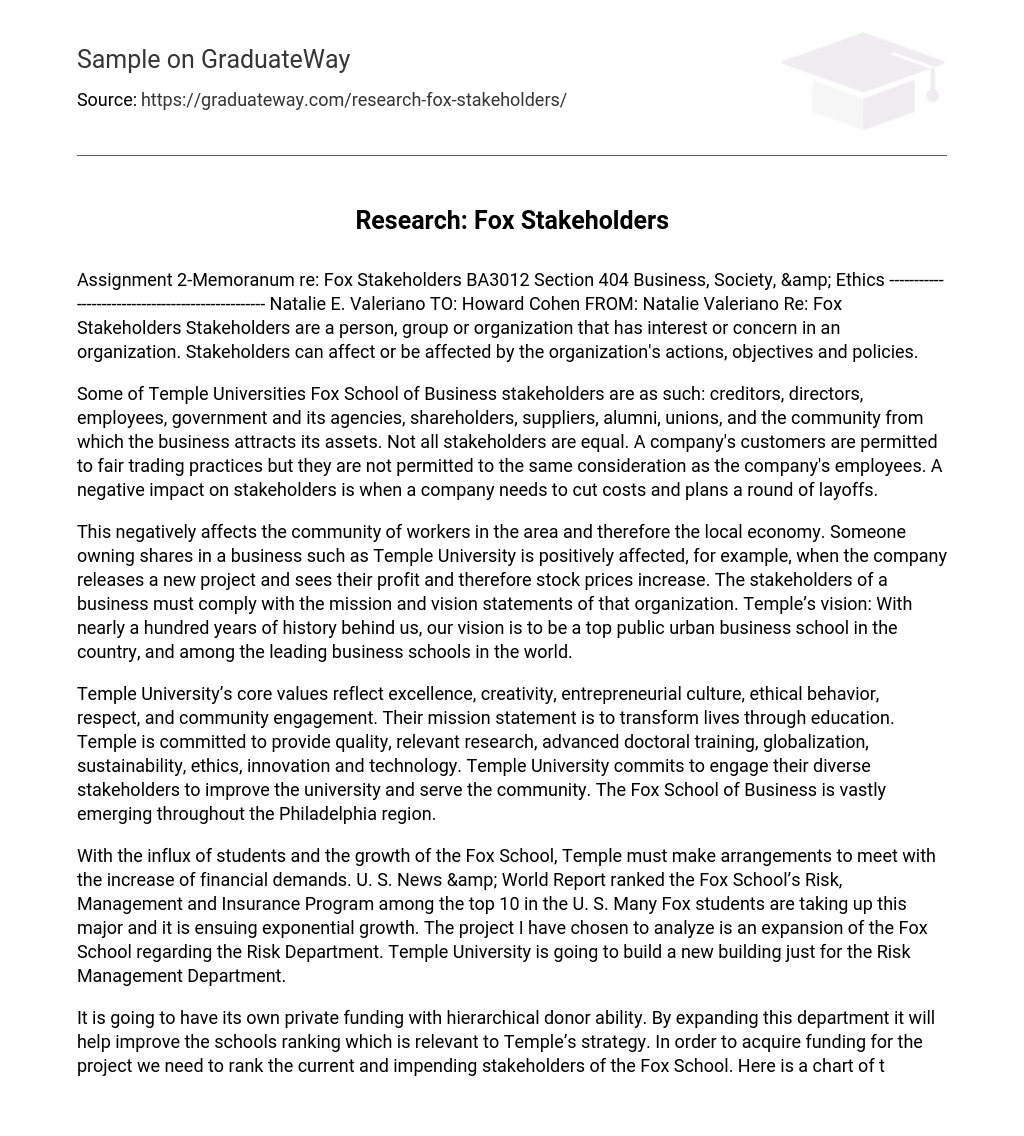Stakeholders are a person, group or organization that has interest or concern in an organization. Stakeholders can affect or be affected by the organization’s actions, objectives and policies. Some of Temple Universities Fox School of Business stakeholders are as such: creditors, directors, employees, government and its agencies, shareholders, suppliers, alumni, unions, and the community from which the business attracts its assets. Not all stakeholders are equal. A company’s customers are permitted to fair trading practices but they are not permitted to the same consideration as the company’s employees. A negative impact on stakeholders is when a company needs to cut costs and plans a round of layoffs.
This negatively affects the community of workers in the area and therefore the local economy. Someone owning shares in a business such as Temple University is positively affected, for example, when the company releases a new project and sees their profit and therefore stock prices increase. The stakeholders of a business must comply with the mission and vision statements of that organization. Temple’s vision: With nearly a hundred years of history behind us, our vision is to be a top public urban business school in the country, and among the leading business schools in the world.
Temple University’s core values reflect excellence, creativity, entrepreneurial culture, ethical behavior, respect, and community engagement. Their mission statement is to transform lives through education. Temple is committed to provide quality, relevant research, advanced doctoral training, globalization, sustainability, ethics, innovation and technology. Temple University commits to engage their diverse stakeholders to improve the university and serve the community. The Fox School of Business is vastly emerging throughout the Philadelphia region.
With the influx of students and the growth of the Fox School, Temple must make arrangements to meet with the increase of financial demands. U. S. News & World Report ranked the Fox School’s Risk, Management and Insurance Program among the top 10 in the U. S. Many Fox students are taking up this major and it is ensuing exponential growth. The project I have chosen to analyze is an expansion of the Fox School regarding the Risk Department. Temple University is going to build a new building just for the Risk Management Department.
It is going to have its own private funding with hierarchical donor ability. By expanding this department it will help improve the schools ranking which is relevant to Temple’s strategy. In order to acquire funding for the project we need to rank the current and impending stakeholders of the Fox School.
This endowment provides many student scholarships and helps establish an MBA concentration in this area. Joseph E. Boettner is one of the leading Temple alumnae stakeholders for this project. The Elmer R. Deaver Professorship is another significant donor contributing to this expansion project. The Elmer R. Deaver Foundation permanently established scholarships, awards and a professorship in the risk department of FSBM. The Deaver Foundation continues to deliver many need-based scholarships for students at Temple University and at colleges and universities throughout the Philadelphia area.
William Aaronson is the Director of the Cochran Research Center and Associate Professor within the Risk Department here at Temple University. He along with the Cochran Research Center will contribute a great amount of funding to this expansion project. We can also receive funding from government relations and bank loans. The dean of the Fox School is Dr. Moshe Porat, who is the former Chair holder of the Joseph E. Boettner Professorship in Risk Management & Insurance and the former Chairman of the Risk Management, Insurance and Actuarial Science department.
He has been awarded several awards for excellence and has many connections and ties to organizations throughout the world. He will be the utmost influence in establishing funding for this project. Stakeholders play a huge role in contributing to the achievement and growth of a university. In order for this expansion of the Risk Department to become a success we must assess our current stakeholders by their donor ability, willingness, and ranking. This will finalize the project and help us take into account who funds new organizations within the university and how it is accomplished.





